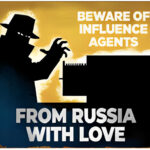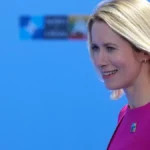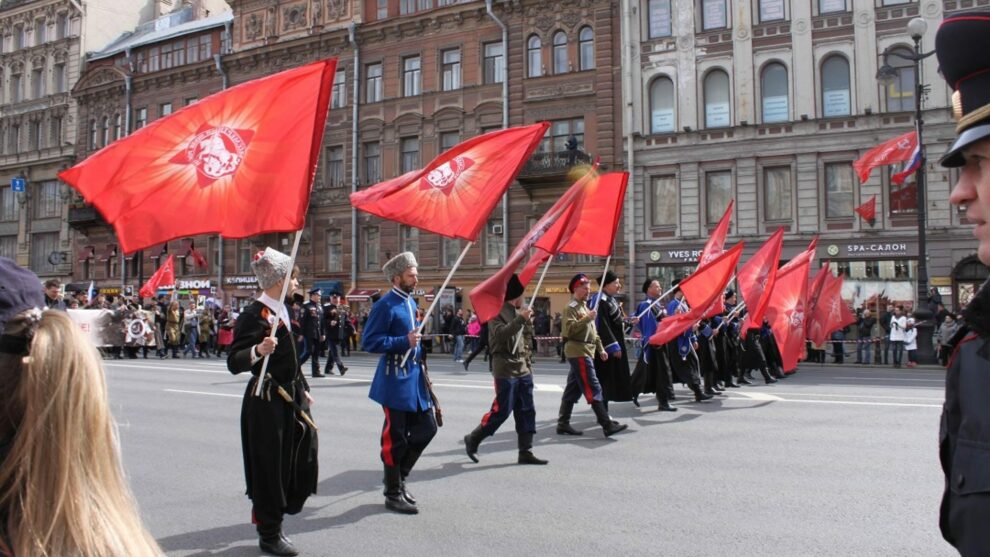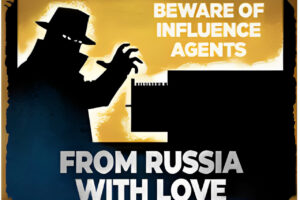More than 30 years after the fall of Communism in Eastern Europe, former Soviet states are still suffering the effects of the war against religion, says one of the founders of an organization formed to record testimonies of the victims of Soviet oppression.
Elena Zhemkova helped found Memorial in Moscow in 1987, before the dissolution of the USSR. Over the following decades the charity collected information about more than three million victims of the Soviet regime, including those murdered, imprisoned or deported.
Under Vladimir Putin’s regime, however, Memorial came under increasing pressure, until it was shut down by the Russian state in 2022. Researchers affiliated with Memorial have been jailed, while others, such as Elena, are living abroad, and unable to return home.
The charity continues to operate at an international level, however, with a special focus on Eastern Europe. In 2022 Memorial was awarded the Nobel Peace Prize, for its Human Rights advocacy.
In November, Elena was invited to give a conference at the Lisbon Meeting, organized by the Portuguese branch of the international Catholic movement Communion and Liberation, which also held an exhibition of some of Memorial’s work.
After her conference, Elena sat down with The Pillar for a conversation during which she explained that many people lost their faith during the Soviet period, but those who didn’t were left better equipped to resist oppressive systems.
“Of course, faith made a huge difference. People with faith had much more strength to overcome the situation and survive. I think that faith was what sustained them and gave them strength. In the Soviet Union many people lost their faith, and that was the aim of the system — they were sent to the Gulag to lose their faith, and the Gulag was very successful in that regard.”
Why was the Kremlin so eager to stamp out faith, though? And what does it have to teach us about religious practice in Russia today?
“Once a person has lost their faith, it is much easier to break them”, Elena said.
Elena comes from a mixed Ukrainian and Russian background.
On one side, she descends from a long line of Ukrainian sailors, and on the other, from a family of Russian Old Believers, Orthodox Christians who rejected the reforms of Patriarch Nikon in the 17th Century.
She describes herself as a rationalist, rather than a person of faith, but that does not keep her from seeing that “in the former Soviet Republics, this problem of lost faith is a very serious issue, because the soviets would kill faith, and try to replace it with mandated belief in Communism.
When the Soviet Union collapsed, and faith in Communism was destroyed, people were left empty, and we can see how that void can be filled with evil things, suspicion, anti-scientific beliefs, she said. “Now those same people are fertile ground for propaganda, because they have no foundations, no backbone, they are quick to discard any morals.”
Orthodoxy or paganism?
Estimating levels of religious belief in majority-Orthodox Christian Russia is a matter of debate. The main religious figure, Moscow Patriarch Kirill, is considered a staunch Putin ally and often boasts of a Russian Orthodox resurgence in his public speeches and sermons, while boasting of the construction of new churches.
In one sermon, in June 2022, Kirill said: “Nowhere, neither in Europe nor in America, are new churches being built, people no longer need them. They are closing, repurposing, and sometimes, instead of temples, dance floors and other entertainment facilities appear. And we, to the horror of the very world that cannot understand us, are building God’s temples.”
“We are the Russia of the 21st century. Isn’t this a miracle of God?” said the patriarch, who has emerged as a leading apologist for the Russian invasion of Ukraine, and Putin’s attempts to justify it as a war on behalf of “Christian values.”
“We, who have gone through all these persecutions, through all this godless ideology, we as a people have risen and are building churches, and a feeling of love for the Fatherland is growing in us. And we see how our young men are now defending Russia on the battlefield. Our priests, who take care of our warriors, tell me about amazing examples of courage, self-sacrifice, the ability to lay down their lives for their friend. Where is it from? Not from a high salary, not from the encouragement of the authorities, not from the desire to advance in the service, but from an inner moral feeling, brought up by the Orthodox faith.”
But despite Kirill’s bullish presentation of Christianity in Russia, the statistics paint a very different picture, placing religious practice in Russia at a mere 7%, according to a 2014 poll by the Pew Research Centre.
“The fact that we have more churches does not imply having more believers,” Elena told The Pillar. “If people really did believe more in God, then they should be changing their behavior, such as ceasing criminal activity, or at least not being silent while crimes are being committed. And from that point of view, I think things are going very badly indeed in Russia.”
“But yes, we do have many more churches,” she said with a sarcastic smile.
This intertwining of the Russian Orthodox Church and state fundamentally benefits Putin, Elena believes.
“For Putin what matters above all is power. And in that sense, the Church, like any other institution, is no more than a tool to consolidating power. The Church is a force that guides people, and influences their behavior, so of course such a powerful tool does not escape the attention of someone like Putin,” she said.
“And in that sense, we should ask believers how it is possible that they are supporting the war in Ukraine. Because I believe that the war, and everything that is happening in Ukraine, flatly contradict Christian values. To me it seems more like a pagan cult.”
Hope prevails, despite ‘darker times’
According to Ukrainian human rights activist Evgeny Zakharov, Elena’s colleague at Memorial, “a certain part of the Russian population, a minor part, but still no less than 5 per cent, is against the war, against Putin, and supportive of Ukraine.”
In a video sent to the Lisbon Meeting, Zakharov said “These people were, and still are, holding anti-war and pro-Ukraine posters, despite the fact that they are facing imprisonment of up to 15 years, they are raising funds for Ukrainian refugees, helping them to leave Russia and go to Europe. I have to admit that there were many fewer dissidents in Soviet times than the Russians who are standing by us today”.
This, said Elena, is where hope lies for the eventual freedom of Russia from dictatorship.
“Of course, I hope that will happen. It is true, there are many more people against Putin now than there were dissidents back then. But, on the other hand, the situation in general is very difficult, because, due to the heritage of the Soviet Union, there is much fear. It doesn’t take much to scare people completely. They have this memory of fear. But the fact that many people are protesting in Russia, despite the difficulties and the danger, does give us more hope.”
Elena’s entire presentation at the meeting in Lisbon centered on the premise that hope is to be found in people, and in appealing to their humanity. That is why Memorial tries to rescue individual stories from the mass of anonymous victims of the Soviet Union.
One of her major criticisms of the Russian Orthodox Church is that it does not focus on people as individuals.
“I think that the path to peace and hope is to address the person. But the problem with the Russian Church is that it does not address the person, the human being. The Church is on the side of the state, and always highlights the primacy of the state, and that is bad. It is the same as it was in pre-Communist Russia, in the time of the Czars,” she said.
“It is no coincidence that the Bolsheviks managed to destroy the Church, and the churches. The people were not opposed, and often even supported it. They didn’t believe in that Church as it existed. We can’t only blame the Bolsheviks, just like we cannot only blame Putin now. If people hadn’t supported the Bolsheviks back then, most of the crimes we document probably wouldn’t have occurred, and in the same way, if people didn’t support Putin now, we would not be seeing the war in Ukraine.”
“Of course,” Elena said, “I do continue to believe in people, and therein lies my hope. But as a person of reason, I have to admit that the situation in Russia, from the human point of view, is not very good. We are at a very bad stage, and we have a lot of work ahead of us.”
Still, Elena said, the current situation in Russia doesn’t quite can’t compare to 1988-1989, when the Communist state began to unravel.
Then, she said, “people were filled with hope, with light, and wanting to achieve justice. Now people are filled with darkness, hate and aggression.”
“I lived through the good times, but now these are darker times,” Elena concluded.
Source : The Pillar















